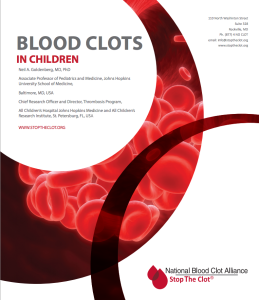How are DVT/PE treated in children?
Definitions:
- Anticoagulants: Medications used to prevent further blood clotting in the veins. Most people outside the medical field call them “blood thinners” or anti-clotting medication. These medications don’t really “thin” the blood. Instead, they make it more difficult for your blood to clot. For this reason, the term “blood thinner” is not preferred, and is not used in this resource.
- Heparin drip: A type of anticoagulant or anti-clotting medication given as a continuous infusion through an IV (a flexible tube placed in a “superficial” (close to the surface) vein, usually in the arm. Heparin drip is only for short-term use when treating DVT/PE.
- Low-molecular-weight heparin: A type of anticoagulant or anti-clotting medication given as an injection under the skin every 12 hours. Examples of LMWH include enoxaparin (sold under the brand name Lovenox in the U.S.) and dalteparin (sold under the brand name Fragmin in the U.S.). Unlike heparin drip, LMWH can be used for both the initial DVT/PE treatment period and the rest of DVT/PE treatment.
- Warfarin: A type of anticoagulant or anti-clotting medication taken by mouth as a pill. Warfarin works by blocking the effect of vitamin K, which helps several of the “clotting factor” proteins in our blood to work properly. Warfarin (sold under the brand name Coumadin in the U.S.) requires regular blood draws to monitor its anti-clotting effect, which can be affected by many other medications and by foods that contain vitamin K. Warfarin also requires an initial period of treatment with heparin drip or LMWH at the same time as warfarin is being taken until the target levels of warfarin’s anti-clotting effect are reached.
- INR test: A blood test that measures anti-clotting effect of warfarin.
- Direct oral anticoagulant (DOAC): A type of anticoagulant or anti-clotting medication taken by mouth as a pill or liquid. After initial treatment with heparin drip or LMWH, DOACs may be an option for many children for the rest of their DVT/PE treatment instead of LMWH or switching to warfarin. The anti-clotting effects of DOACs may be affected by some other medications, but fewer medications than warfarin. Also, unlike warfarin, anti-clotting effects of DOACs are not affected by foods.
- Thrombolysis: Clot-buster therapy. Thrombolysis can be given in a variety of ways. Most DVT/PE do not require this kind of treatment. In general, thrombolysis medications have a higher bleeding risk than anticoagulants. Because of this, their use is saved for special situations.
Treatment
When doctors diagnose your child with blood clots for the first time, they will usually treat them with anti-clotting medications, also known as anticoagulants or “blood thinners.”
Anti-clotting medications decrease the risk of a new DVT developing or an existing DVT getting larger. They also help prevent a DVT from breaking loose and traveling to the lungs and causing a PE, which can be life-threatening. For most children, the risk of a new DVT developing, a DVT growing, or a DVT breaking loose and causing a PE is highest during the first several weeks after their DVT/PE was first diagnosed, or first developed. The length of time of increased risk for more clots or PE is what blood doctors (called “hematologists”) consider when they determine how long a child with DVT/PE should stay on anti-clotting medications. (More information on the topic of length of treatment is provided later.)
Anti-clotting medications are not proven to “get rid of” DVT/PE. Doctors and scientists do not yet fully understand the factors that lead blood clots to resolve over time. One factor may include how well a child’s own blood chemistry works to breaks down a DVT/PE, which may also be affected by the types of other illnesses that the child may have, and how severe those other illnesses are at the time that the DVT/PE is being treated.
Doctors usually start to treat children’s blood clots with anti-clotting medications while they are in the hospital. Most often, they either start children on a heparin drip through an IV, or with low-molecular-weight heparin (LMWH) injections under the skin about every 12 hours. After several days, and at least by the time a child is ready to go home from the hospital, they either continue LMWH or switch the anti-clotting medication to an oral (pill or liquid) option.
Before 2021, the main anti-clotting medication available to children as a pill was warfarin (known under the brand name Coumadin in the U.S.). Diet and other medicines can affect warfarin’s ability to control a child’s blood clotting. Because of this, warfarin requires weekly to monthly blood tests to check clotting levels in a child’s blood. We call this an international normalized ratio or INR test. The INR test requires a blood sample drawn from a vein, usually on the inside of the elbow.
More recently, oral medicines called direct oral anticoagulants (DOACs) have become available for use in children. Rivaroxaban, sold under the brand name Xarelto and dabigatran, sold under the brand name Pradaxa, are examples of DOACs that have been approved by the U.S. Food and Drug Administration to treat blood clots in children. DOACs do not usually require blood draws to check clotting levels.
Some other medicines, but not diet, can affect the effect of DOACs on blood clotting. Although DOACs may be a treatment option for many children with blood clots, LMWH or warfarin may be recommended by a child’s hematologist (blood doctor) as the best option, depending on the child’s specific situation and needs. For example, if a child has a type of antibody in the blood called an “antiphospholipid antibody” (tested at the time that the DVT/PE is diagnosed), LMWH may be recommended instead of a DOAC. Teenagers, children with autoimmune conditions, children with recent infections, and children whose DVT/PE seemed to develop without any triggering factors or events, may be at risk for having these antiphospholipid antibodies.
In some severe cases of DVT/PE, doctors may recommend clot-buster therapy – called “thrombolysis” – in the first few days or weeks of blood clot treatment. Due to bleeding risks and other risks that are related to clot-buster medications and procedures, it is not recommended in most children. Unlike anti-clotting medications, clot-buster therapy removes or breaks up your child’s blood clot. If a child undergoes clot-busting treatment, anti-clotting medications are needed afterward to prevent new blood clots from forming.
In addition to selecting the treatment for a child’s DVT/PE, hematologists also try to identify the risk factors that may have contributed to the child’s risk of developing their DVT/PE. Reducing or eliminating those contributing risk factors also helps to prevent a DVT from growing or new DVTs/PEs from developing. For example:
- Doctors prescribe antibiotics to treat severe bacterial infections that may have contributed to the development of a child’s DVT/PE
- If a teenager is taking birth control pills that contain estrogen, doctors will stop or switch that medication since receiving extra estrogen contributes to the development of a DVT/PE
- If a child’s DVT occurred near a catheter that is in a deep vein (“central venous catheter” or “central line”), the central line will usually be removed as soon as it is no longer needed.
Neil A. Goldenberg, MD, PhD
Professor of Pediatrics and Medicine, Johns Hopkins University School of Medicine,
Baltimore, MD, USA
Founding Director, Pediatric Thrombosis & Stroke Programs
Johns Hopkins All Children’s Hospital
St. Petersburg, FL, USA
Updated: September 2024





